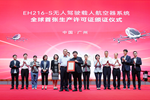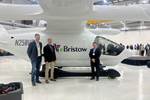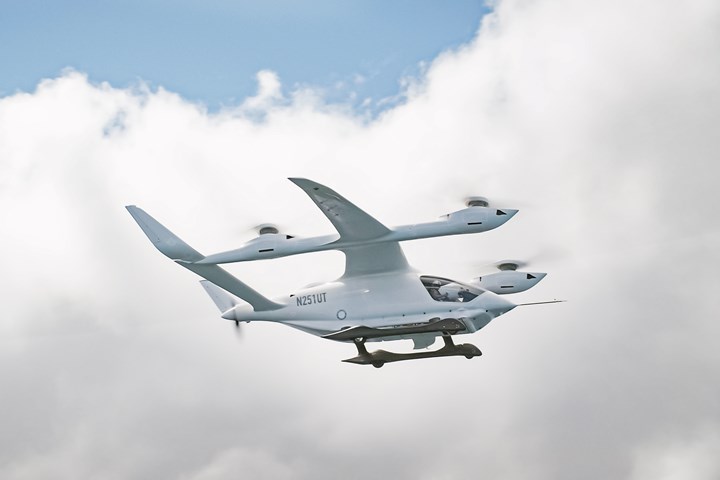Beta’s Alia eVTOL achieves piloted transition flight
Full transition from VTOL hover, to wing-borne cruise, and back to hover, prepares Beta for next steps in progressing its aircraft platforms.
Beta Technologies (South Burlington, Vt., U.S.) has made another milestone in its efforts to develop all-electric aircraft for short-haul and regional operations with zero operational emissions and reduced operational costs. Piloted by Nate Moyer, Beta’s test pilot and former experimental test pilot for the U.S. Air Force, the company’s Alia electric vertical takeoff and landing (eVTOL) achieved full transition, going from hover to wing-borne flight and then back to hover before landing.
The Beta team has designed two aircraft variants under its Alia platform: an eVTOL aircraft and a fixed-wing, electric conventional takeoff and landing (eCTOL) aircraft. According to Vertical Magazine, the eCTOL’s “entire structure, including its avionics, interior, and pusher motor, closely mirrors that of the eVTOL version, except it doesn’t have the overhead lifting propellers.”
The company has long been flying its eCTOL aircraft with a pilot on board, accomplishing several milestones with the prototype. This includes a multi-mission flight from Plattsburgh, New York, to Louisville, Kentucky, in December 2022; a demonstration flight in the greater New York airspace in February 2023; and the aircraft’s first international flight across the border to Montreal, Quebec, in September 2023, among other flight milestones. The company says it has clocked more than 40,000 nautical miles across both aircraft types in the four years that it has flown both Alia prototypes. Beta also completed its first Alia eCTOL deployment with the DOD in January 2024.
In addition, progress continues on other fronts — Beta says it recently received UL certification on its charge cube, set a distance record for manned battery-powered flight, opened its production facilities and have hit other certifications and technical milestones with both aircraft and infrastructure.
Beta plans to type certify its eCTOL with the Federal Aviation Administration (FAA) in 2025, followed by its eVTOL in 2026. The aircraft will be used for military missions, cargo logistics and medical delivery.
Related Content
-
Midnight production aircraft completes full transition flight
This is Archer’s second full-scale eVTOL aircraft to achieve this milestone, critical to being able to carry commercially viable passenger payloads.
-
Lilium launches M&A process, targets eVTOL program continuation
Despite court-approved insolvency filings and beginning first investor briefings, Lilium remains fully focused on re-emerging following restructuring, setting its sights on fresh investment to support the Lilium Jet.
-
Honda begins production of 2025 CR-V e:FCEV with Type 4 hydrogen tanks in U.S.
Model includes new technologies produced at Performance Manufacturing Center (PMC) in Marysville, Ohio, which is part of Honda hydrogen business strategy that includes Class 8 trucks.

















